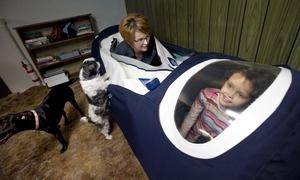Family improves health of ailing children with hyperbaric chamber

By the time Scott and Gerri Williams brought their two young children to see Dr. Zahangir Khaled at his Methodist Medical Group Pediatric Gastroenterology practice in 2007, their lives were unraveling rapidly.
Khaled was the fourth GI doctor the family had seen.
"Austin and Sydney had been typical, non-complicated pregnancies. But when Austin was 1 year old, he started regressing," said Gerri Williams.
She left her job as a registered nurse to care full time for their children, who were sick for long periods of time and regressing physically and academically. The family saw doctor after doctor trying to get a diagnosis for their mysterious illnesses.
Today, Austin, 10, and Sydney, 8, are different children with an optimistic prognosis. Khaled is hoping their remarkable improvement can influence medical practice in the future.
Starting point
First, he prescribed probiotic supplements for the children to improve the beneficial bacteria in their digestive tracts. He also started them on an elimination diet, reducing foods that might be causing allergic reactions. Even so, the illnesses continued unabated.
Ultimately, the family ended up at the Cleveland Clinic in Ohio where the children were diagnosed with mitochondrial disease. Austin had already been diagnosed with autism.
"We were told most children with mitochondrial disease don't live past 10," Williams said, explaining the disease prevents cells from using food to generate the energy necessary for life.
Hospitalizations continue
The children continued to deteriorate. In addition to regular trips to Peoria from their home outside Springfield to see Khaled, the family started coming to Peoria for more frequent hospitalizations.
At one point, doctors were discussing putting the children on a ventilator to help them breathe and a feeding tube to get some nutrients into their bodies.
"We were meeting with Dr. Khaled constantly. It had gotten to the point Sydney couldn't sustain life anymore," Williams said.
Sydney was vomiting constantly and losing her hair. Both children had continual illnesses ranging from GI upsets to ear infections, eye infections and sinusitis. Austin was having seizures. Sydney had pneumonia three times in six months. Both children were listless and without energy.
Finding hope
Williams, meanwhile, was spending long hours searching the Internet looking for clues to explain what was happening. She stumbled across a glimmer of hope.
"I was worried about talking to Dr. Khaled about what I found on the Internet. I asked his nurse first. How would he respond?" she said.
The response was positive. Khaled encouraged the family to try hyperbaric treatment at the Wisconsin Integrative Hyperbaric Center outside Madison, Wis. Treatment there lasted the entire month of May 2009.
Scott Williams took a leave from his job as a police officer in Chatham. The family moved up to Wisconsin for the month.
"Hyperbarics has been around for over 100 years. It's used for wound therapy, stroke patients, post-traumatic brain injury, bone infections, but as for mitochondrial disease, the decision is not in," said Williams. "But we were slowly losing our children. We were watching life drain out of them."
Hyperbarics is a combination of highly concentrated oxygen and pressure. Rather than relying on blood to distribute oxygen to cells, hyperbaric treatments use pressure to push oxygen directly into cells.
The FDA has approved hyperbaric therapy for treatment of decompression sickness, gangrene, brain abscesses and injuries in which tissues are not getting enough oxygen.
The Wisconsin Integrative Hyperbaric Center focuses on treatment of autism, cerebral palsy, stroke, multiple sclerosis, mitochondrial disorders, chronic fatigue, traumatic brain injury, attention deficit disorder and more.
Health insurance did not cover treatment for Sydney and Austin. The charge at the center for a month of daily treatments was $5,000 for one child and half that for the second child.
Treatment is typically a series of 40 sessions lasting one hour, two times a day. After just three sessions, the Williams family saw something unusual.
Finally, a turning point
Back at their motel room, Austin and Sydney pushed each other. Then they began shoving each other. They had never had the energy to roughhouse before, and the parents were stunned.
"After the third treatment, Sydney was hungry. She gobbled lunch like she had never eaten before. She used to wake up at night screaming with stomach pain and throwing up. After the third treatment, she slept all night," Williams said.
At the Wisconsin center, the children received pressurized oxygen therapy in a large steel chamber together. Back home in Chatham, the family's church and community helped with the purchase of a $25,000 soft cloth chamber set up in their family room. Now the children have about three treatments a week at home.
They have been weaned from most medications. Their physician at Cleveland Clinic expects their progress will continue.
Almost 'normal'
"Our children have learned to play like normal kids," Scott Williams said. A backyard swing set and climbing beams are now a favorite activity for these children who once lacked the energy even to play.
The family had never been well enough for a family vacation, and they had never had the money because all of their income went to medical bills, supplements and special allergen-free foods. This summer, they were able to go to a local water park and play miniature golf.
Scott Williams said, "We have struggled and gone through turmoil the last 10 years. We want to share what we learned. We received the gift of our children's lives. We'd like to share our experience to help others."
Khaled still treats the children and has witnessed their improvement.
"It has been remarkable. Based on my clinical observations, I can see hyperbaric treatment is helping. No doubt," he said.
Khaled now strongly recommends hyperbaric therapy for children diagnosed with mitochondrial disease and hopes other hyperbaric therapy programs expand to include children with this diagnosis.
Scott and Gerri Williams can be reached by e-mail at scottgerri@yahoo.com.
Clare Howard can be reached at 686-3250 or choward@pjstar.com.
Reprinted with permission http://www.pjstar.com/features/x1487290724/Under-pressure-to-improve-the...





